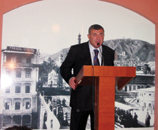United opposition present campaign platform
By Ana Datiashvili
Tuesday, December 4

The same day, Mikheil Saakashvili officially kicked off his re-election bid, unveiling a prominent academic as his campaign manager.
The United National Council, a coalition of opposition parties, hopes to install Gachechiladze as a placeholder in January while it sets about turning the country into a parliamentary republic.
“Our goal is to create conditions that would prevent the usurpation of power by one person, or a narrow circle of people. The January 5 elections are the first stage of achieving this goal,” Gachechiladze said.
He also spoke of a “Georgian approach” which envisaged a “Georgia which is Georgian and neither American nor Russian, and which aspires to European-style statehood,” according to the online media source Civil Georgia.
Key to this, he said, was conferring a “special status” on the Georgian Orthodox Church. However, he did not say what this status would entail.
He also said that while Euro-Atlantic integration was his “preference and ambition,” normalizing relations with Russia would be a key part of the opposition coalition’s foreign policy.
Other “major principles” that he put forward included tolerance and respect for minorities, a proposed increase in pensions, and the goal of boosting small and medium-sized businesses.
Also on December 3, United National Movement leader Mikheil Saakashvili—who formally resigned from the presidency on November 25 to make way for the January 5 snap election—unveiled Pridon Todua, a prominent academic, as his campaign chief.
Todua has never been involved in politics till now, but has good relations with Saakashvili.
“Maybe this government has made mistakes, but we should remember the many successful and democratic things that have happened over the past four years,” Todua declared.
So far, Saakashvili’s re-election bid has focused on addressing Georgia’s social problems and returning IDPs to the breakaway regions.